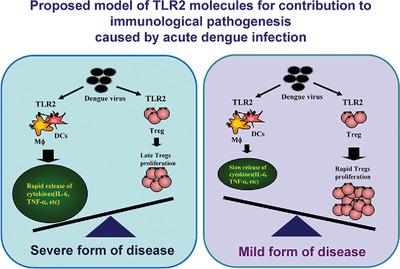当前位置:
X-MOL 学术
›
Eur. J. Immunol.
›
论文详情
Our official English website, www.x-mol.net, welcomes your
feedback! (Note: you will need to create a separate account there.)
Double-faced implication of CD4+ Foxp3+ regulatory T cells expanded by acute dengue infection via TLR2/MyD88 pathway.
European Journal of Immunology ( IF 4.5 ) Pub Date : 2020-03-03 , DOI: 10.1002/eji.201948420 Junu A George 1 , Seong Ok Park 1 , Jin Young Choi 1 , Erdenebelig Uyangaa 1 , Seong Kug Eo 1
European Journal of Immunology ( IF 4.5 ) Pub Date : 2020-03-03 , DOI: 10.1002/eji.201948420 Junu A George 1 , Seong Ok Park 1 , Jin Young Choi 1 , Erdenebelig Uyangaa 1 , Seong Kug Eo 1
Affiliation

|
Dengue infection causes dengue fever (DF) and dengue hemorrhagic fever/dengue shock syndrome (DHF/DSS). CD4+Foxp3+ Tregs are expanded in patients during dengue infection, and appear to be associated with clinical severity. However, molecular pathways involved in Treg proliferation and the reason for their insufficient control of severe diseases are poorly understood. Here, dengue infection induced the proliferation of functional CD4+Foxp3+ Tregs via TLR2/MyD88 pathway. Surface TLR2 on Tregs was responsible for their proliferation, and dengue‐expanded Tregs subverted in vivo differentiation of effector CD8+ T cells. An additional interesting finding was that dengue‐infected hosts displayed changed levels of susceptibility to other diseases in TLR2‐dependent manner. This change included enhanced susceptibility to tumors and bacterial infection, but highly enhanced resistance to viral infection. Further, the transfer of dengue‐proliferated Tregs protected the recipients from dengue‐induced DHF/DSS and LPS‐induced sepsis. In contrast, dengue‐infected hosts were more susceptible to sepsis, an effect attributable to early TLR2‐dependent production of proinflammatory cytokines. These facts may explain the reason why in some patients, dengue‐proliferated Tregs is insufficient to control DF and DHF/DSS. Also, our observations lead to new insights into Treg responses activated by dengue infection in a TLR2‐dependent manner, which could differentially act on subsequent exposure to other disease‐producing situations.
中文翻译:

CD4 + Foxp3 +调节性T细胞通过TLR2 / MyD88途径受到急性登革热感染的双重影响。
登革热感染会导致登革热(DF)和登革出血热/登革热休克综合征(DHF / DSS)。CD4 + Foxp3 + Tregs在登革热感染期间会在患者体内扩增,并且似乎与临床严重程度有关。但是,人们对Treg增殖所涉及的分子途径及其对严重疾病的控制不足的原因了解甚少。在这里,登革热感染通过TLR2 / MyD88途径诱导功能性CD4 + Foxp3 + Treg的增殖。Treg上的表面TLR2负责其增殖,登革热扩展Treg破坏了效应CD8 +的体内分化。T细胞。另一个有趣的发现是,登革热感染的宿主对TLR2的依赖方式对其他疾病的易感性水平发生了变化。这一变化包括对肿瘤和细菌感染的敏感性增加,但对病毒感染的抵抗力大大增强。此外,登革热增生的Treg的转移可保护受体免受登革热引起的DHF / DSS和LPS引起的败血症的侵害。相比之下,登革热感染的宿主更容易发生败血症,这归因于早期TLR2依赖性促炎细胞因子的产生。这些事实可能解释了为什么某些患者中登革热增殖的Treg不足以控制DF和DHF / DSS。此外,我们的观察结果对由登革热感染以TLR2依赖性方式激活的Treg反应产生了新的见解,
更新日期:2020-03-03
中文翻译:

CD4 + Foxp3 +调节性T细胞通过TLR2 / MyD88途径受到急性登革热感染的双重影响。
登革热感染会导致登革热(DF)和登革出血热/登革热休克综合征(DHF / DSS)。CD4 + Foxp3 + Tregs在登革热感染期间会在患者体内扩增,并且似乎与临床严重程度有关。但是,人们对Treg增殖所涉及的分子途径及其对严重疾病的控制不足的原因了解甚少。在这里,登革热感染通过TLR2 / MyD88途径诱导功能性CD4 + Foxp3 + Treg的增殖。Treg上的表面TLR2负责其增殖,登革热扩展Treg破坏了效应CD8 +的体内分化。T细胞。另一个有趣的发现是,登革热感染的宿主对TLR2的依赖方式对其他疾病的易感性水平发生了变化。这一变化包括对肿瘤和细菌感染的敏感性增加,但对病毒感染的抵抗力大大增强。此外,登革热增生的Treg的转移可保护受体免受登革热引起的DHF / DSS和LPS引起的败血症的侵害。相比之下,登革热感染的宿主更容易发生败血症,这归因于早期TLR2依赖性促炎细胞因子的产生。这些事实可能解释了为什么某些患者中登革热增殖的Treg不足以控制DF和DHF / DSS。此外,我们的观察结果对由登革热感染以TLR2依赖性方式激活的Treg反应产生了新的见解,











































 京公网安备 11010802027423号
京公网安备 11010802027423号